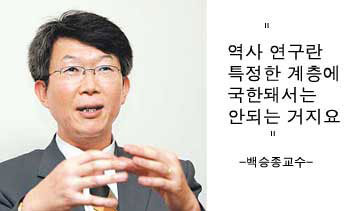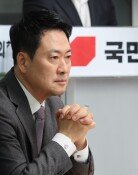Talking with 500 Years Ago

By Pack Seung-chong (pp. 488)
18,000 won, published by Stone Pillar
Who says "Time flies"! Unable to stop the flowing time, Kim In-hoo, great scholar of the mid-Chosun Dynasty, passed away. But, 500 years later in the 21st century, a scholar is trying talking with Kim.
PACK: "May I ask you a question? How was your life as a Confucian scholar? Can you summarize it for me?"
KIM: "Your question sounds like ordering me to catch the flowing cloud up in the air. How can I sum up the complicated life of a human being in a single word?"
Their conversation, starting with the question, drifts into details of the life of a Confucian scholar in the 16th century Chosun Dynasty, vividly depicts, through the eyes of Kim, the details such as family chores, teacher and pupil relationship, poem and drink, and the like.
Researcher of micro-history, professor Pack has already shown us his micro-historic approach to a certain age through his book History and Langue of the State, in which he explored the ordinary man Lee Chan-kap.
So far, the micro-history was mainly used for understanding the general public of a certain age through various historic data. That way it was avoided to examine history centered around the data left by noblemen who could understand and write books. Pack, however, says, "I don`t think I have to limit myself to only a certain group of people in exploring the ordinary life of the past." He made it clear that he would apply his approach to exploration of the scholastic life and idea of the Chosun Dynasty. And having Kim say, "History is not all about that of the public," he indicates the direction in which he would lead the micro-history.
"We are living in an era when people are trying to overcome the ideological confusion and set up a new ideology of the age. In this respect, Kim`s era shares some things with the current age," says the author. In this sense, Kim is a perfect character to guide us through the days of the Chosun Dynasty when Confucianism did not settle in firmly. Kim`s life clearly shows how intellectuals of the time, who first had accepted various religious and theological ideas, later got to adhere to Confucianism, getting into the 16th century.
Especially, the hypothetical conversation is a very effective approach to exploration of figures like Kim. In an ear when literature, history and philosophy were not clearly distinguished, most of intellectuals expressed their ideas in the form of poems or essays. The writings, however, did not receive the treatment they deserve outside the boundary of literature. In addition, if a work of a person is considered containing high literary values, people classify the writer as a novelist or poet, leaving little for exploration of the figure as philosopher and historian. The same is true of Kim, who left 1,600 poems.
Kim`s approach, by means of conversation, mobilizes all the previous research achievements to represent the various aspects of the human Kim, and help readers understand the ideas and life of a Confucian scholar of that time.
It is pleasant not only for the ordinary readers but also for the scholars to meet a historic figure not as an object of a research, but as an ordinary human being. Pack`s wife recalls, "Last winter, when he indulged himself in this project in Germany, the cold weather could not make him down. He was always happy." Talking to Kim through various historic data all day long, he came back to his home with a translated poem of Kim to share his joy with his wife.
"Meeting with a human who loved poem and drinking, I felt myself being changed," said Pack. It would not be an easily obtainable joy also for a reader to discover him/herself being changed through meeting with a person who lived 500 years ago, and to listen to a conversation with the person.
Hyoung-Chan Kim khc@donga.com




![“잠만 자면 입이 바싹바싹”…잠들기 전에 이것 체크해야 [알쓸톡]](https://dimg.donga.com/c/138/175/90/1/wps/NEWS/IMAGE/2026/02/23/133404749.3.jpg)


